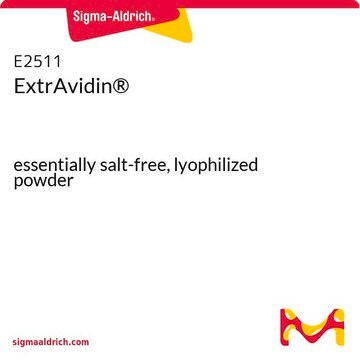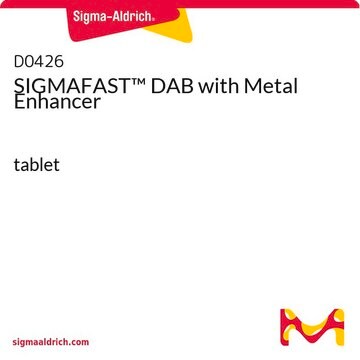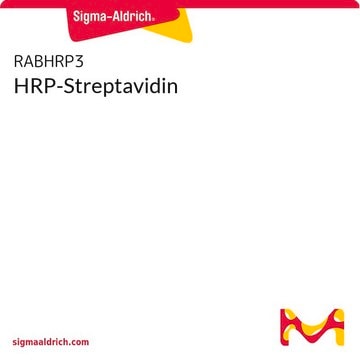E2886
ExtrAvidin®−Peroxidase
buffered aqueous solution
Synonym(s):
ExtrAvidin HRP
About This Item
Recommended Products
conjugate
peroxidase conjugate
form
buffered aqueous solution
technique(s)
direct ELISA: 1:2,000
dot blot: 1:4,000
immunohistochemistry (formalin-fixed, paraffin-embedded sections): 1:100
shipped in
wet ice
storage temp.
2-8°C
Looking for similar products? Visit Product Comparison Guide
Specificity
Application
Biochem/physiol Actions
Physical form
Preparation Note
Storage and Stability
Legal Information
Disclaimer
Signal Word
Warning
Hazard Statements
Precautionary Statements
Hazard Classifications
Skin Sens. 1
Storage Class Code
12 - Non Combustible Liquids
WGK
WGK 2
Flash Point(F)
Not applicable
Flash Point(C)
Not applicable
Personal Protective Equipment
Choose from one of the most recent versions:
Certificates of Analysis (COA)
Don't see the Right Version?
If you require a particular version, you can look up a specific certificate by the Lot or Batch number.
Already Own This Product?
Find documentation for the products that you have recently purchased in the Document Library.
Customers Also Viewed
Protocols
Use this protocol to for the entire immunohistochemistry (IHC) procedure through staining and visualization of specific antigens in paraffin-embedded tissue sections.
Use this protocol to for the entire immunohistochemistry (IHC) procedure through staining and visualization of specific antigens in paraffin-embedded tissue sections.
Use this protocol to for the entire immunohistochemistry (IHC) procedure through staining and visualization of specific antigens in paraffin-embedded tissue sections.
Use this protocol to for the entire immunohistochemistry (IHC) procedure through staining and visualization of specific antigens in paraffin-embedded tissue sections.
Our team of scientists has experience in all areas of research including Life Science, Material Science, Chemical Synthesis, Chromatography, Analytical and many others.
Contact Technical Service













